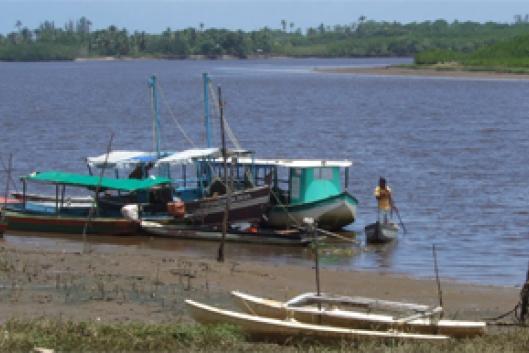Brazil’s coasts are seriously threatened by a range of large-scale projects. The privatization of waterbodies, concessions over public waters for free to big consumers, and installation of fish farms are some of the activities that are endangering the mangroves and the livelihoods of local communities.
Changes made to the forest law have benefited industrial aquaculture, providing support for shrimp farms that were in decline due to a common disease in shrip farms, the white spot syndrome virus. The debts owed by these industries were practically renegotiated by the government, rather then being a reason to stop the public funding to this sector with such high environmental and social costs of its opereations..
Another activity that has had a major impact on mangroves is the construction of hydroelectric dams. Many people from the communities were expelled from our territories for the building of large dams do not have access to energy. These projects affect the dynamics of the rivers and of the species who live there, includingtheir reproductive cycles, which diminishes the productivity of the ecosystems, causing serious impact for traditional peoples. This situation makes life increasingly unviable for fishermen and fisherwomen in Brazil.
The mangroves in many places are fenced off, and not only by concrete walls and barbed wire. Recently, in the municipality of Maragojipe, in the state of Bahia, a landowner erected an electric fence in a mangrove area, which led to the death of a crab catcher who accidentally touched the electrified wire.
As we face these grave problems, we also find ourselves in a situation where our statements are discredited, because they have been characterized as “romantic”. This is why traditional peoples, those of us who come from the wetlands themselves and are tied to the mangroves, have no choice but to fight back and defend our territories.
The state has tried to render our work invisible. The government claims that we do not produce much, but we contribute to the country’s fish catch, and this is our means of earning the respect of society. That is precisely one of the challenges we face: raising awareness of the importance of the economic viability of small-scale producers – farmers and artisanal fisherfolk – and thereby working to dispel the idea that we do not produce anything, that we are “backwards” people who must be integrated into “development”. This attitude reflects profound environmental racism, because these “development” projects make our way of life unviable, and this constitutes an attack on the coastal peoples.
For all these reasons, our struggles must be integrated. We must view development and territory as two elements that are not separate. Projects like mining, hydroelectric dams, large-scale tourism, shrimp farms and monoculture plantations are all happening within the same territory inhabited by communities. This is why our approach to defending our territory must be wide: for us, our territory is our way of life, an entire set of knowledge, skills, customs and traditions.
Some time ago we initiated a campaign for the legal recognition of fishing territories and have worked to promote a specific law to protect and guarantee our territories. In Brazil, and particularly in Bahia, fishing areas have been grabbed by private interests. To confront this situation, we organized ourselves, and this gave rise to the Movement of Fishermen and Fisherwomen (MPP), whose aim is to promote policies and laws for the people of the sea and the people of the water. The Movement is now more than a decade old, and was born from the people’s need to organize in order to fight against the various threats that we face. When people organize, they can demand their rights, and demand that governments create specific laws for society.
Thanks to the struggles fought in the past, fisherfolk today in Brazil have the same rights as a government employee or public worker: they enjoy the right to pensions and social security. To achieve these gains, we had to fight many battles, and were moved by a powerful conviction of the need to reaffirm our identity as artisanal fisherfolk. This identity is fundamental, especially when anything local is often considered to be of inferior quality in “third world” countries. This is why the MPP strives to highlight the social and cultural importance of a centuries-old activity like fishing, which should be viewed as cultural heritage.
Elionice Sacramento, a fisherwoman from the state of Bahia, Brazil and member of the Movimento dos Pescadores e Pescadoras do Brasil (MPP). Excerpts from her presentation at the meeting of the board of directors of Redmanglar Internacional, 2013.
